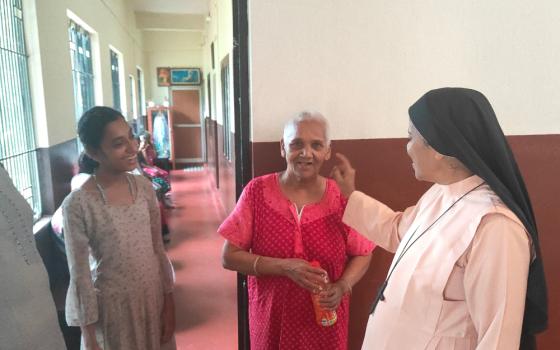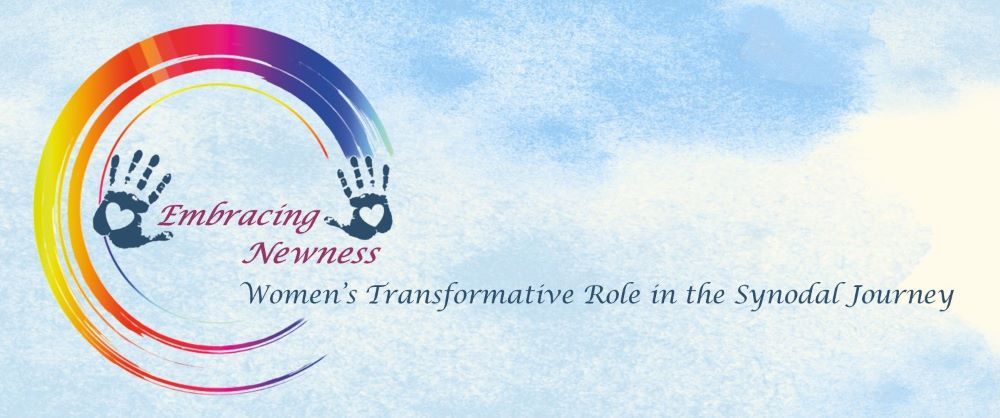
(Monique Tarabeh)
Reflecting on women's roles through the lens of the synodal journey, Pope Francis' decision to address his letters to the people of God as brothers and sisters marks a significant move towards greater inclusion, setting a tone of equity and harmony. By avoiding titles and using inclusive language, he emphasized unity and interconnectedness within the church, resonating deeply with the spirit of the synod. His consistent highlighting of the indispensable role of religious women underscores the importance of embracing the theology of women, acknowledging the unique contributions women make to both the church and society, embodying compassion, love and teaching through their feminine essence.
In our lives as women religious, the growth path often requires letting go of attachments and embracing transformation. While it's natural to dwell on losses, our spiritual journey beckons us to focus on the opportunities for growth and renewal that lie ahead. Rooted in the divine feminine, which symbolizes the birthing of new life and newness, women religious are called to cultivate a mindset of continual growth and evolution.
Despite the challenges of releasing what no longer serves us, many of us are experiencing a sense of completion in becoming smaller in number, aging, closing ministries and selling property. Yes, this process can be painful. In these moments, however, the wisdom of St. Mary Euphrasia Pelletier comes to mind when she said: "If the congregation remains with eight sisters, do not worry, for you are engaged in a noble mission. This mission is not yours alone, but God's." As we feel that we are approaching the conclusion of certain chapters in our lives, letting go can feel like losing a part of our identity. Conversely, learning the art of growth in letting go offers a new perspective on our pain.
I attended a Mass at the Shrine of Our Lady of the Snows in Belleville, Illinois. The service was in Spanish, and I was pleased that I understood the homily. One key takeaway from the Gospel reading was the story of Jesus appearing to Thomas and the other disciples after the resurrection. Jesus showed them His wounds and said, "Peace be with you." Despite His wounds, He did not let His pain speak for Him. As the priest said in Spanish, "Él está herido pero no dolido" (He is wounded but not hurt). The message resonated with me: We should let our peace speak through us, not the pain we hold from our wounds.
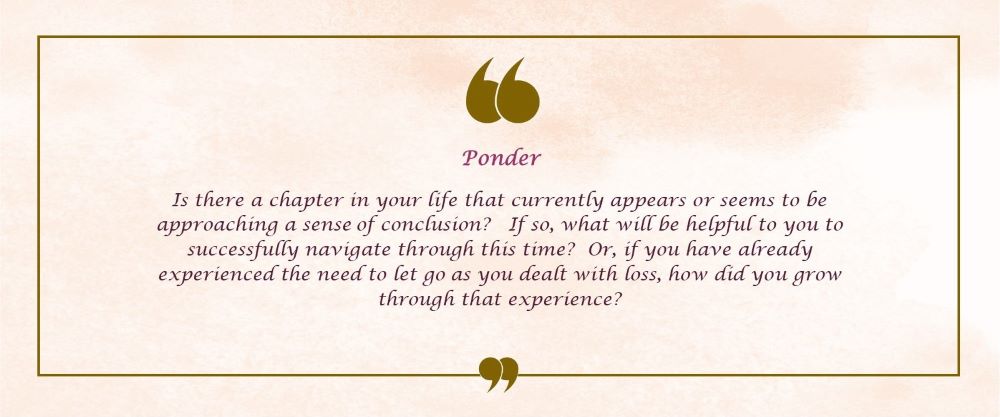
(Monique Tarabeh)
God has blessed us with the feminine aspect which embodies the essence of creation and renewal. Like mothers giving birth to new life, we as women religious are called to nurture and cultivate newness within ourselves and our communities. This divine gift serves as a reminder of our innate ability to adapt, evolve and flourish in the face of change. As we embrace moments of completion and transition, we are gifted with the opportunity to release attachments and welcome the unknown with faith and courage. To move forward, we must leave something behind and open ourselves to the endless possibilities that lie ahead.
Women leaders often prioritize the values of compassion, love and teaching, reshaping traditional hierarchical structures and cultivating inclusive environments where every voice is heard and valued. Their contributions enrich the synod journey, infusing it with a richness born from diverse perspectives and a commitment to collective discernment and action. In our leadership endeavors, whether formally in designated roles or as active members within our communities, we prioritize newness and growth by openly communicating our intentions, challenges and decisions.
This commitment to openness not only ensures clarity but also promotes an atmosphere of trust and mutual respect. When each person feels informed and included in the decision-making process, she is more likely to feel valued and empowered to contribute meaningfully to the collective mission. Through newness and growth-driven leadership, we strive to create an environment where dialogue invites everyone to the table, knowing that each person brings her own valuable wisdom. Dissent is respectfully heard, and unity is forged through shared understanding and common purpose.
This inclusive approach enriches decision-making processes with diverse perspectives and insights. Moreover, newness and growth in leadership encourage a culture of learning. We acknowledge our fallibility and embrace vulnerability, understanding that newness is not about representing perfection but rather about authenticity.
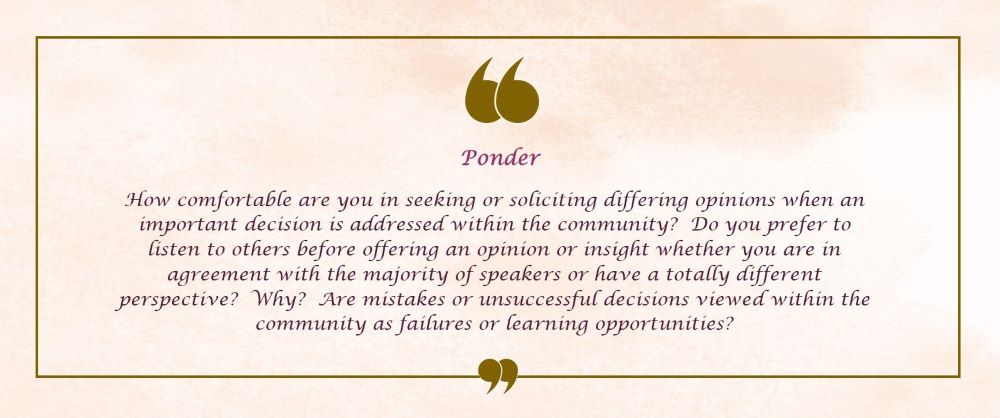
(Monique Tarabeh)
In Falling Upward: A Spirituality for the Two Halves of Life, Richard Rohr quotes Thomas Merton's insightful observation:
In the way we've structured our lives, we often spend our entire existence climbing the ladder of supposed success, only to reach the top and realize it's leaning against the wrong wall. At the summit, we find that what we thought we wanted isn't truly fulfilling. To return to a state of inherent abundance, we must release all false agendas, unreal goals, and passing self-images. It's all about letting go.
Letting go is often the first step toward meaningful collaboration. Collaboration doesn't always come easily; in fact, it's often quite challenging. According to an old African proverb, it's faster to work alone, and there's truth in that. Collaboration, on the other hand, demands excellent communication, mutual interests, thorough planning and strong relationships.
Unlike top-down approaches, collaboration emphasizes shared goals, collective wisdom, and mutual empowerment. We leverage collaboration to build consensus, harness collective creativity, and address complex challenges facing our communities. At the heart of collaboration lies the recognition of each individual's inherent worth and dignity.
Despite our reality of diminishment and the challenges of growing in letting go, a collaborative attitude fosters a profound sense of ownership and belonging, empowering individuals to contribute their talents and skills for the common good. By keeping the mission at the heart of our efforts, we are committed to living the fullness of life.
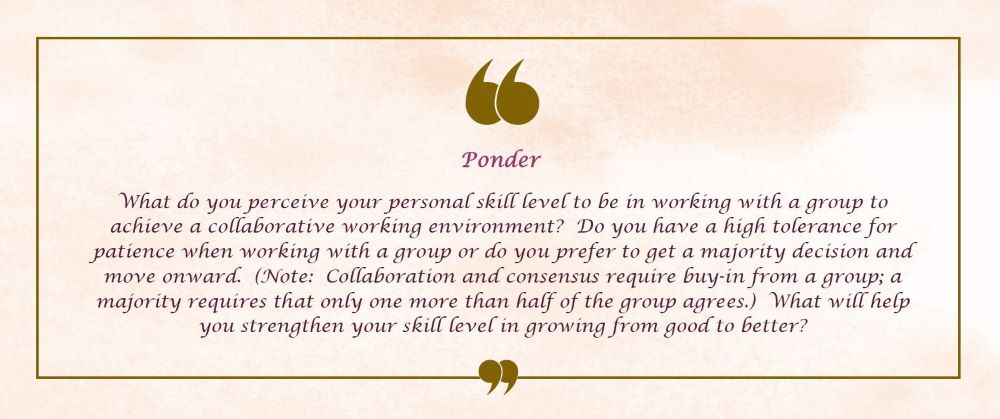
(Monique Tarabeh)
As I participated in the Leadership Collaborative, or CLDP, I found Sr. Linda Buck's explanation of the Johari window insightful. This model offers a useful framework for understanding and enhancing interpersonal collaboration and relationships within our religious communities. It consists of four quadrants:
- Open: In our roles, we strive to expand this quadrant by sharing our thoughts, feelings and intentions openly with our constituents. By doing so, we reduce the size of the hidden quadrant, where aspects of ourselves are known to us but not to others. Through transparency, we invite others to see and understand us more fully, fostering trust and authenticity within our community.
- Hidden: This quadrant includes aspects of ourselves that are known to us but not to others. Through self-disclosure and openness, we aim to shrink this area, promoting deeper connections and mutual understanding.
- Blind: Aspects of ourselves that others see but we may not recognize live here. By actively seeking feedback and listening to others with humility, we minimize this quadrant, gaining insights that spur personal and collective growth.
- Unknown: This quadrant encompasses aspects of ourselves that neither we nor others are aware of. It represents untapped potential and undiscovered strengths. Embracing curiosity and self-exploration helps us uncover and integrate these unknown facets, enriching our leadership and community engagement.
Advertisement
The synodal journey and our roles as women religious who embrace the divine feminine call us to embrace the transformative power of newness and growth. Pope Francis' inclusive approach sets a precedent for a more equitable and harmonious Church, where every voice, especially those of women religious, is valued and heard. By letting go of old attachments and welcoming change, we can cultivate a mindset of continual evolution, embodying the divine feminine's essence of creation and renewal. Through collaboration and open communication, we enrich our communities, fostering a culture of trust, mutual respect, and shared purpose. As we move forward, let us remain steadfast in our commitment to nurturing new life and possibilities, ensuring that our collective mission reflects the fullness of life and the boundless potential within us all.

